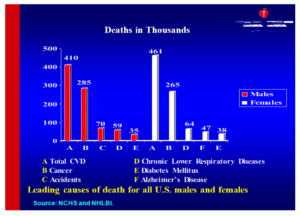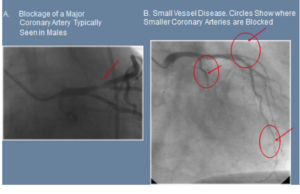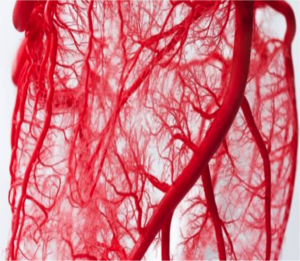 Cardiovascular disease is the leading cause of death for all American adults, both men and women. The American Heart Association has been instrumental in publicizing the fact that coronary artery disease is as large a medical issue for women as it is for men.
Cardiovascular disease is the leading cause of death for all American adults, both men and women. The American Heart Association has been instrumental in publicizing the fact that coronary artery disease is as large a medical issue for women as it is for men.
Often in the past, coronary artery disease was misdiagnosed in women, as they often have persistent angina, but without discernable blockages in their coronary arteries, as visualized by coronary angiograms. It is now beginning to be appreciated that these women do have coronary artery disease, but it is affecting not the major coronary vessels, but a myriad of smaller coronary arteries in women’s hearts. Small vessel disease in women is a major unmet medical need, affecting women world-wide.
Cardiovascular disease is the leading cause of death in the US in both men and women. Surprisingly, more women than men suffer from cardiovascular disease. Of note, deaths from cardio-vascular in women are almost double the figure for women dying from all forms of cancer.
The most prevalent forms of coronary artery disease in men and women are shown in the figure below, which is an angiogram of coronary arteries. On the left hand side of the figure is the type of blockage most prevalent in men, namely the blockage of a major coronary artery. On the right side of the figure is the type of disease most prevalent in women, blockage of the smaller coronary arteries.
Potential Breakthrough Therapy for Heart Disease: Therapeutic Angiogenesis
Therapeutic angiogenesis is the use of natural growth factors found in our bodies to stimulate the process of new vessel growth in under-perfused organs or tissues, such as the diseased heart. Therapeutic angiogenesis stimulates angiogenesis where it is required but is lacking. Angiogenesis is a natural process; when we cut ourselves, angiogenic growth factors in our bodies are released to stimulate the growth of new blood vessels in the injured tissues. When a person is afflicted with coronary artery disease, growth factors can fashion a new “collateral” blood circulation network in the heart, but in many cases, this collateral circulation is not sufficient to provide the heart muscle with ample blood perfusion, and the symptoms of heart disease appear. These patients are attractive candidates for therapeutic angiogenesis.
Fibroblast growth factor 1 (FGF-1), a Potent Stimulator of Angiogenesis
FGF-1 is a natural protein contained within our bodies. It is released upon tissue injury and is the body’s natural response to tissue repair. Human FGF-1 stands out as an attractive therapeutic angiogenesis candidate to treat heart disease due to its potency and its ability to stimulate the production of not only capillaries, but larger arterioles, which are critical in bringing more blood into the injured heart tissue.
Clinical Evidence that FGF-1 Could be a Breakthrough Therapy for Heart Disease
A number of clinical trials, both in Europe and the U.S., have established that FGF-1 has the potential to be a breakthrough drug for the treatment of coronary artery disease.
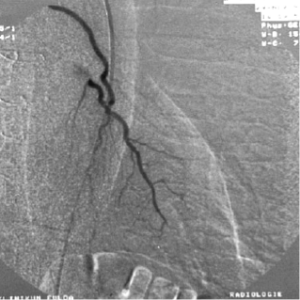
The figure here is from results obtained from a clinical trial in Germany. It displays a coronary artery angiogram from a patient with severe heart disease who received human FGF-1 as a local injection directly into the heart muscle. One can see on the right hand side of the figure the robust “blush” of new blood vessel growth (angiogenesis) 12 weeks after FGF-1 was injected into the ischemic heart wall. All patients who received this treatment experienced a decrease in their angina chest pain and performed better on exercise testing.
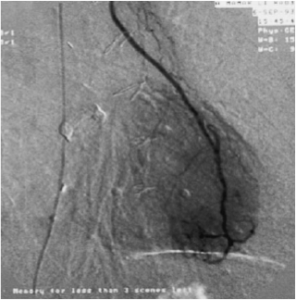
In a US FDA-authorized Phase I clinical trial where FGF-1 was injected into the hearts of no-option heat patients, there was a remarkable improvement in angina scores and exercise treadmill tests 12 weeks after the patients received the treatment. The clinical trial received substantial publicity as evidenced in the link below to an ABC Nightly News Broadcast discussing the success that was seen using FGF-1 to treat severe coronary artery disease.
In this video you can see growth of new blood vessels in the heart of one of the patients who was treated with FGF-1. It is believed that once this treatment is available to the public (after US FDA approval is obtained), it could extend by decades the lives of millions of people suffering from coronary artery disease.
 Dr. Jack Jacobs is president and Chief Science Officer of Zhittya Genesis Medicine, a bio-pharmaceutical company based in Las Vegas that is developing regenerative biotechnology products through FDA-authorized clinical trials.
Dr. Jack Jacobs is president and Chief Science Officer of Zhittya Genesis Medicine, a bio-pharmaceutical company based in Las Vegas that is developing regenerative biotechnology products through FDA-authorized clinical trials.
Don’t miss Dr. Jacobs’s presentations on this topic at FreedomFest July 21-24, 2021, at the Rushmore Monuments Civic Center in Rapid City, South Dakota.
 For more information about Zhittya Genesis Medicine, our medical science and our clinical trials, you can visit www.zgm.care. If you wish to speak to our Chief Executive Officer, Dan Montano, you can email him at [email protected] or call 702-802-8373.
For more information about Zhittya Genesis Medicine, our medical science and our clinical trials, you can visit www.zgm.care. If you wish to speak to our Chief Executive Officer, Dan Montano, you can email him at [email protected] or call 702-802-8373.

